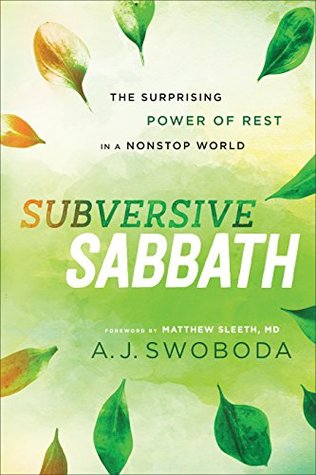More on this book
Community
Kindle Notes & Highlights
by
A.J. Swoboda
Read between
January 22 - April 28, 2025
more critical than a gift is how we handle the gift.
Avoidance of critically examining our ideas, in the end, is the worst (and least Christian) idea of them all.
We have come to know Jesus only as the Lord of the harvest, forgetting he is the Lord of the Sabbath as well.
because we do not preach the Sabbath, our congregations are not challenged to take it seriously themselves. The result of our Sabbath amnesia is that we have become perhaps the most emotionally exhausted, psychologically overworked, spiritually malnourished people in history.
To keep a Sabbath is to give time and space on our calendar to the grace of God.
“That God rested on the seventh day, and blessed and sanctified it, is the first divine action which man is privileged to witness; and that he himself may keep the Sabbath with God, completely free from work, is the first Word spoken to him, the first obligation laid on him.”
Humanity had only God’s goodness to celebrate, nothing more. Work had not even begun.
The Sabbath teaches us that we do not work to please God. Rather, we rest because God is already pleased with the work he has accomplished in us.
Sabbath reminds us that “our time” was never our time in the first place. All time is God’s time. And the time we have been given is to be used faithfully in worship of him.
Consider the final words of the old English martyr John Bradford, who reportedly declared as he died on the stake: “Look at creation—look at it all! This is the world God has given to his enemies; imagine the world he will give to his friends.”37
Sabbath is a scheduled weekly reminder that we are not what we do; rather, we are who we are loved by.
Sabbath is something enjoyed for its own sake, inviting us to play. And play is not undertaken to accomplish; it is undertaken for its own sake.
We are not to know about the Sabbath. We are to know the Sabbath.
Sabbath is not extra credit. It is a commandment, not a suggestion.
the Bible has a word for Sabbath minus any work: laziness. Likewise, the Bible has a word for work without a Sabbath: slavery.
In Matthew’s Gospel, in fact, we find that Jesus calls himself both the “Lord of the harvest” (Matt. 9:38) and the “Lord of the Sabbath” (Matt. 12:8). Personally, that reminds me that Jesus is Lord over my work and Jesus is Lord over my rest. He is not Lord over just one. Both are realms of his lordship and my discipleship. Jesus is Lord of rest and work.
The Sabbath reminds us that nothing that is worth doing can be fully achieved in one day.
If we wait for the work to be completely finished before we can rest, we will never enter rest. The powerful lesson is that God remains at work on the Sabbath—in us.
As we think about what to do and not do on the Sabbath, we should be quick to realize that our question should be less about certain activities and more about how we are posturing our hearts.
What defines work? And rest? Our hearts.
a cult exists anywhere people are not permitted to say no.1
“fear of missing out.”
The devil is most successful, indeed, when he pushes us to feel obliged to be yes-people who have no choice or little ability to say otherwise; he considers his job done when we feel trapped to say only yes to the masses, our closest friends, or even our religious authorities.
The Sabbath is God’s stand against the tyranny of always having to say yes.
Corrie ten Boom once wrote, “If the devil cannot make us bad, he will make us busy.”
God’s rest is always more effective than human work.
The root sin of busyness is sloth—that laziness of spirit in which the muscles of intention of discernment and boundary have atrophied. In sloth, we refuse to do “what we are created to do as beings made in the image of God and saved by the Cross of Christ.”5
There are times we trust God to help others through others. Not every need represents God’s will for our lives. How freeing!
As the Lord healed on the Sabbath in the Gospels, the gospel frees us to be healed by the Lord of the Sabbath.
Sabbath brings about a new rhythm that is largely out of sync with the rhythms all around us. That is a good thing. The life of a Christian is not to be conformed to the patterns and timelines of the world.
But we so quickly forget the Sabbath’s healing power. It is not uncommon in pastoral ministry to talk to people about their exhaustion. When the topic arises, I love using it as an opportunity to discuss the biblical invitation to rest. Often a person will ask for prayer to get rest. Quite frankly, I often feel tempted to refuse to pray for them. The fact that one is exhausted when overworking eighty hours a week and never keeping a Sabbath is not a prayer issue; it is an obedience issue. We should not pray for God to do what we are supposed to do.
God is not likely to answer in prayer what you are unwilling to repent of.
We pray for healing rest without being willing to allow God’s disruption of our overworked schedules. But can that really work? Who expects to lose weight without changing their diet?


